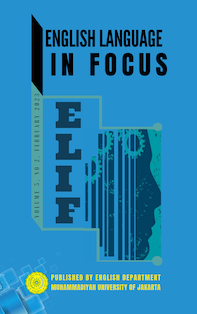The Lexicalization Across Languages (a Cultural Relativity in Mongondownese Students)
DOI:
https://doi.org/10.24853/elif.5.2.161-170Keywords:
Culture, Mongondownese, Across Languages Lexicalization, InterferencesAbstract
This study focused on identifying the types of lexicalization across languages occured in Mongondownese English language learners’ oral form, and finding out some factors contributed their lexicalization. In this study, it was analyzed by using the canonical theory by Kadarisman (2009) about types of lexicalization across languages, which is synthesized by using pre survey/field orientation, interview, and recording audio and audio-visual material as technique of data collecting. Therefore, by involving 8 Mongondownese students of English department as the participants, finally the researcher concluded that there are three kinds of across languages lexicalization occur in participants utterance namely, equal lexicalization, unequal (culture-specific) lexicalization, and unbalanced lexicalization. Furthermore, these are caused by the cultural factor and the limitedness of individual ability factor.Published
2023-02-28
Issue
Section
Articles
License
Authors who publish with this journal agree to the following terms:
- Authors retain copyright and grant the journal right of first publication with the work simultaneously licensed under a Creative Commons Attribution License that allows others to share the work with an acknowledgment of the work's authorship and initial publication in this journal.
- Authors can enter into separate, additional contractual arrangements for the non-exclusive distribution of the journal's published version of the work (e.g., post it to an institutional repository or publish it in a book), with an acknowledgment of its initial publication in this journal.
- Authors are permitted and encouraged to post their work online (e.g., in institutional repositories or on their website) before and during the submission process, as it can lead to productive exchanges, as well as earlier and greater citation of published work (See The Effect of Open Access).


